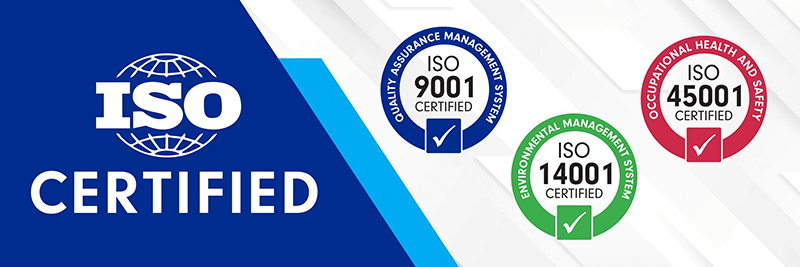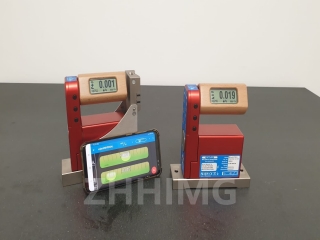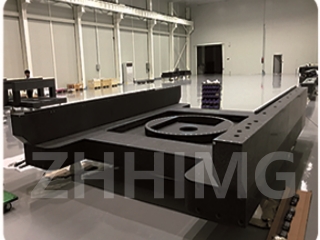In the field of semiconductor manufacturing, precision is everything. As chip manufacturing technology continues to advance towards the nanometer level and even the nanometer level, any tiny error may lead to a decline in chip performance or even complete failure. In this competition for ultimate precision, granite precision accessories, with their unique physical and mechanical properties, have become a key element in ensuring the nanoscale precision of chip production.
Outstanding stability lays the foundation for precision
The environment in the semiconductor manufacturing workshop is complex, and external factors such as vibration and temperature changes constantly threaten the production accuracy. Granite precision accessories have extremely high stability, providing a solid foundation for chip production. Its internal structure is dense and uniform, formed through geological processes over hundreds of millions of years, and it has a natural high damping characteristic. When external vibrations are transmitted to production equipment, granite precision parts can effectively absorb and attenuate over 80% of the vibration energy, significantly reducing the impact of vibrations on precision equipment.
This characteristic is particularly important in the photolithography process. Photolithography is a crucial step in transferring the design patterns of chips onto silicon wafers, which requires the worktable of the photolithography machine to maintain extremely high stability. The granite precision workbench can isolate the vibration interference from the workshop floor and other equipment, ensuring that the relative position error between the silicon wafer and the photolithography mask is controlled at the nanometer level during the exposure process of the photolithography machine, thereby guaranteeing the precise transfer of the pattern.
In addition, the coefficient of thermal expansion of granite is extremely low, usually ranging from 5 to 7×10⁻⁶/℃. During the semiconductor manufacturing process, the heat generated by the operation of equipment and the fluctuations in the workshop environment temperature can both cause thermal deformation of materials. Granite precision accessories are almost unaffected by temperature changes and can always maintain stable dimensions and shapes. For instance, in the chip etching process, even a slight change in temperature may cause thermal expansion of the key components of the etching equipment, resulting in deviations in the etching depth and precision. However, using granite precision accessories as support and load-bearing components can effectively prevent this situation from occurring, ensuring the high precision and consistency of the etching process.
High-precision processing and surface quality advantages
The high-precision processing technology of granite precision parts is also an important factor in ensuring the production accuracy of chips. Through advanced ultra-precision processing technology, the surface flatness, straightness and other precision indicators of granite accessories can reach an extremely high level. For instance, by adopting CNC grinding and polishing techniques, the surface roughness of granite can be reduced to the nanometer level, making the surface finish approach a mirror-like effect.
In chip manufacturing equipment, the high-precision surface quality of components such as granite precision guide rails and sliders can significantly reduce friction and wear between moving parts. This not only enhances the stability and accuracy of the equipment's movement, but also prolongs the service life of the equipment. Take chip packaging equipment as an example. The precise granite guide rails can ensure that the error of the movement trajectory of the packaging head when picking up and placing the chip is controlled at the micrometer or even nanometer level, thereby achieving precise alignment and reliable connection between the chip and the packaging substrate.
Anti-wear and long-term stability
Semiconductor manufacturing is a continuous and long-term production process, and the equipment needs to operate stably for a long time. Granite has excellent wear resistance, with a Mohs hardness of 6 to 7, capable of withstanding long-term mechanical movements and loads. In the daily operation of chip manufacturing equipment, granite precision parts are not prone to wear and tear and can always maintain stable performance and accuracy.
Compared with other materials, granite does not experience fatigue deformation or performance degradation during long-term use. This means that the chip production equipment using granite precision components can still maintain high precision and stability after long-term operation, effectively reducing the product defect rate caused by the decline in equipment precision. For semiconductor manufacturers, this not only enhances production efficiency but also reduces production costs.
Conclusion
On the path of pursuing nanoscale precision in semiconductor manufacturing, granite precision parts play an irreplaceable role with their outstanding stability, high-precision processing and long-term reliability. From photolithography to etching, from chip packaging to testing, granite precision accessories run through every key link in chip production, providing a solid guarantee for the high-precision manufacturing of chips. With the continuous development of semiconductor technology, the requirements for precision will become increasingly higher. Granite precision parts will also continue to play an important role in this field, helping the semiconductor industry to constantly reach new heights. Whether now or in the future, granite precision parts will always be the core force ensuring nanometer-level accuracy in semiconductor manufacturing.
Post time: May-07-2025



